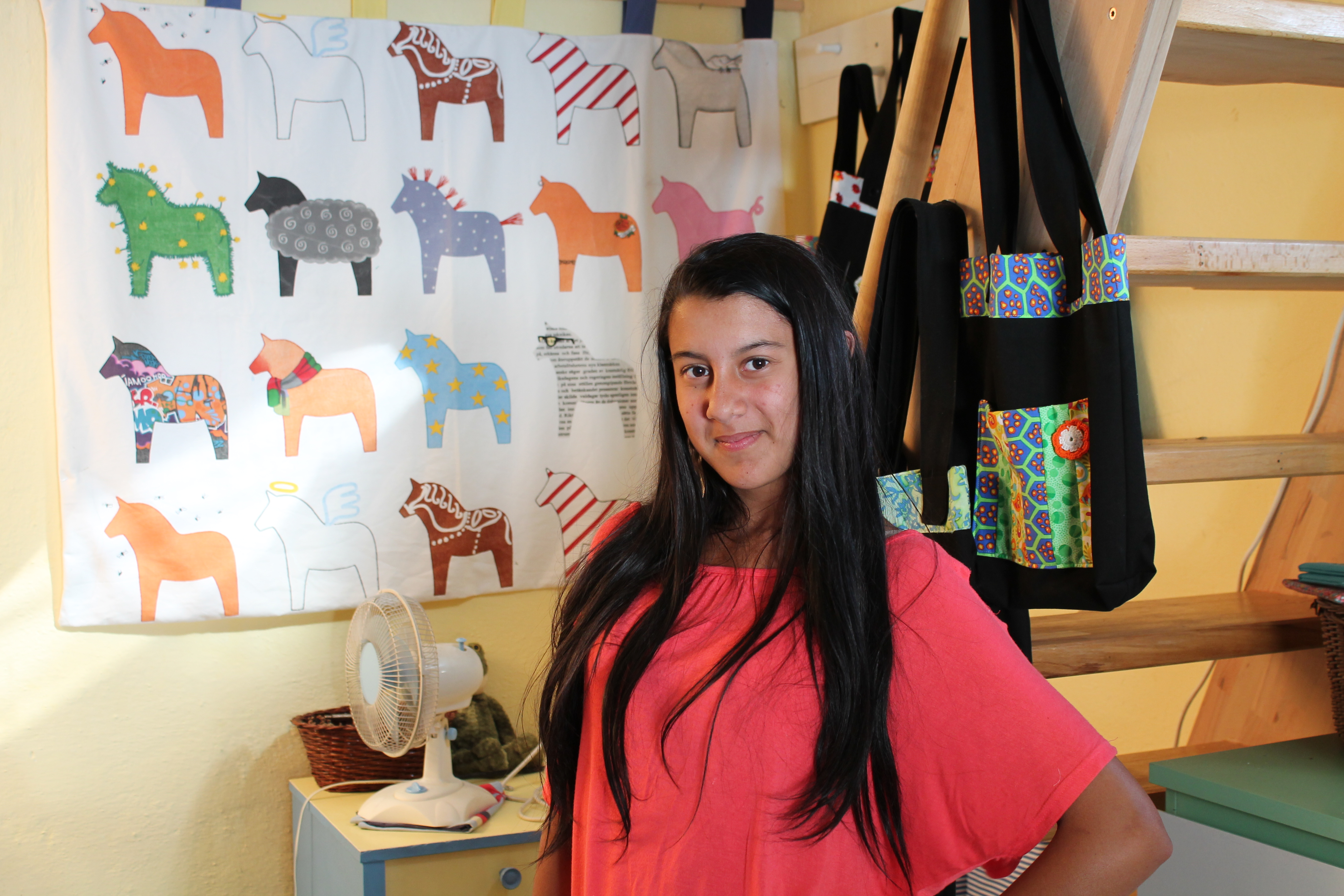“Education is the most powerful weapon to change the world.”
Issues in education are widespread throughout Slovakia, but they especially affect Romani communities. I’ve spoken with Romani parents as well as leaders from Slovak, Romani and U.S. groups who have cited a lack of care for Romani students in schools.
Others have acknowledged that teachers try, but teaching is difficult because children aren’t encouraged to learn at home and become easily bored and restless in school. I’ve observed both sides of the argument, and I see valid points to both views. However, in every community, village and school I’ve visited, I’ve witnessed a clear desire and drive to learn.
In the village of Rankovce, I asked some of the younger girls milling about the settlement if they enjoyed school. They said yes with an enthusiasm I wasn’t expecting after everyone had been going on about how Romani children hated school.“What’s your favorite subject?” I asked a girl named Jessica. “I like Slovak,” she said.
“What do you want to be when you grow up?”“I want to be a builder,” she said with a smile.I turned to her friend. “What subject do you like?” “Mathematics,” she said.“And what do you want to be?” “I want to be a doctor,” the girl said with a defiant look.
The challenges of becoming a doctor or even graduating high school are enormous. If she makes it past the early years of lackluster teachers and rowdy classes and finishes primary school, she’ll have to be accepted to gymnasium, a pre-college preparation school used in the Slovak system.
The problem is gymnasiums are accepting fewer students than previous years, and Romani students lack the resources and support needed to get in. She may need help just finding enough money for the bus to get to the testing center to take her entrance exam. After gymnasium, she’ll need to be accepted to a state university. If she does become a doctor she’ll have to deal with the discrimination and prejudice associated with being Romani in Europe. Most businesses wouldn’t hire her to work in a restaurant much less a hospital operating room.
The obstacles seem insurmountable, but the dreams are still there.
I’ve visited three schools so far: one vocational high school in Kežmarok , an arts and music Conservatory and School of Social Work in Košice and a primary through high school run by the brilliant Romani scholar Anna Koptová.
Mrs. Koptová wrote the book when it comes the history and current issues of the Romani people (literally I read my supervisor’s copy).
She encourages her students to embrace their ethnic identity, and they’ve gone on to study everything from chemistry to international affairs. One student even became one of the few Romani priests in Slovakia.
Unfortunately for educators, there never seems to be enough money to go around. Funds for libraries and university resources are scarce. At the fringes of the system, Romani students get the leftovers.
“They don’t want to fund Romani schools,” Irena Adamová, the director of the School of Social Work told me when I visited the conservatory. “We apply for grant after grant but we don’t get them.”
I’ve visited three schools specializing in helping Romani students. All three of them have had to close down their satellite and daughter schools in other villages due to lack of funding. Most are private with some state help, but not enough to keep them running.
Things don’t look well for the schools that are still functioning either; I spoke with directors who mentioned they may soon have to close their doors, taking away jobs from Slovak and Romani teachers and hurting students’ chances for a better life.
I visited a vocational high school in Kežmarok where students are able to specialize in a trade such as carpentry, metalworking, sewing and hair-dressing. While these trades don’t by any means guarantee them a job, I did see positive results in the lives of the students participating.
They weren’t always excited to go-they’re high school students after all-but when I visited the school, I watched students learning, laughing and working together.
I looked through the school’s scrapbook of achievements and events. As I flipped through the pages, I saw photographs of students dancing in festivals, making clothing, going on educational field trips, raking leaves, volunteering, holding campaigns to fight AIDS, painting the faces of children at fairs, playing table tennis, laughing, studying and being typical high school students.
I didn’t buy the myth that Romani people never wanted to work or contribute to society. I had proof of the opposite in the scrapbook in my hands.
Opportunity makes a difference.
Belief makes a difference.
How can anyone expect the Romani to believe in themselves if they can’t believe in them first? Success will not always look like a perfect model of Western development. Success will not be necessarily measured by outsider ideals.
I met a former missionary who was visiting a very poor, all-Romani settlement. I told him the story about Jessica and her friend who wants to be doctor.
“Really?” He seemed surprised. “I wonder what children dream about in this village.”
He said it like he didn’t expect them to dream at all.
We don’t have any easy answers when it comes to education. Schools and libraries need funding. Racism in the hiring and legislative processes has to be addressed. Students need encouragement at home.
Above all, students need opportunity and belief. They need to stop being treated as if they are inferior. They need to be encouraged to dream. They need to be able to say, yes, I will be a doctor and know it can come true.







Leave a Reply